第10讲Reading comprehension (2) & Basic Tense-新初一衔接班讲义(无答案)
文档属性
| 名称 | 第10讲Reading comprehension (2) & Basic Tense-新初一衔接班讲义(无答案) |
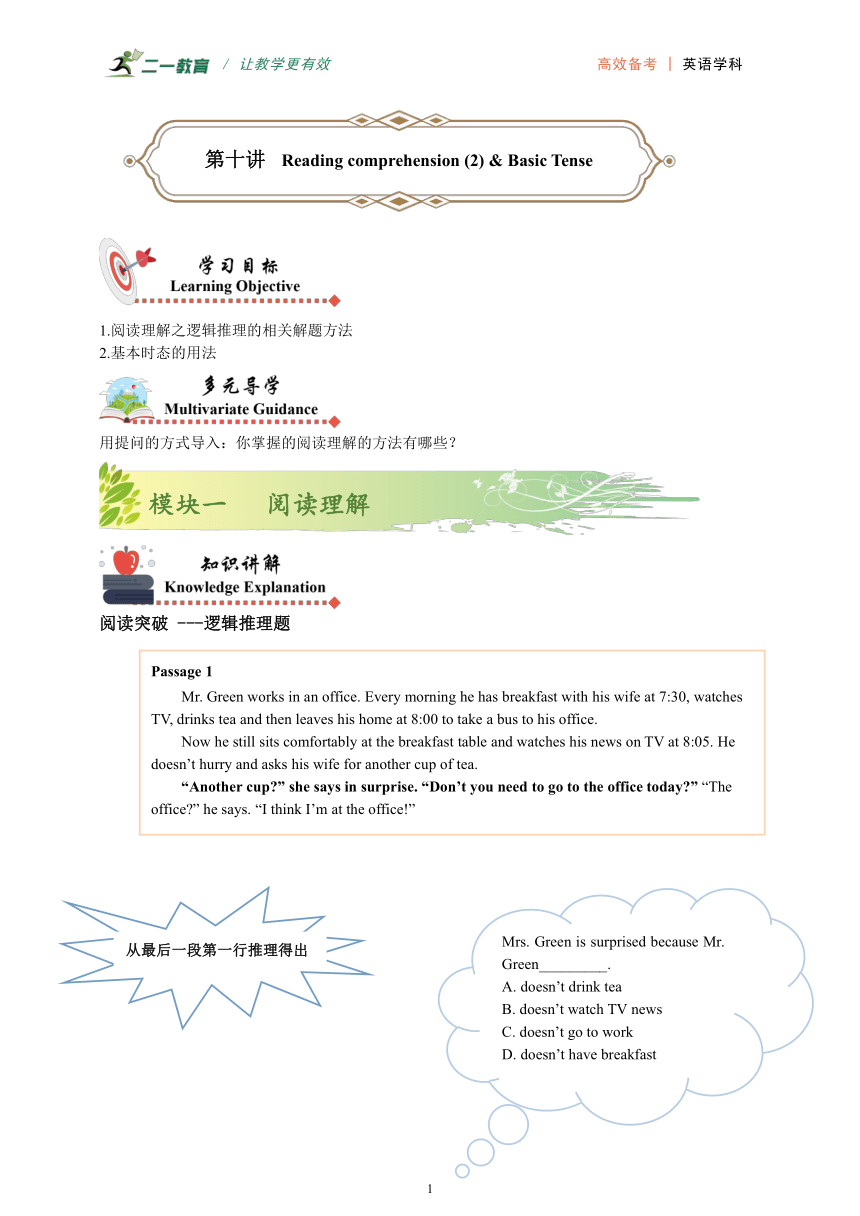
|
|
| 格式 | docx | ||
| 文件大小 | 690.7KB | ||
| 资源类型 | 试卷 | ||
| 版本资源 | 通用版 | ||
| 科目 | 英语 | ||
| 更新时间 | 2025-05-13 17:17:08 | ||
图片预览

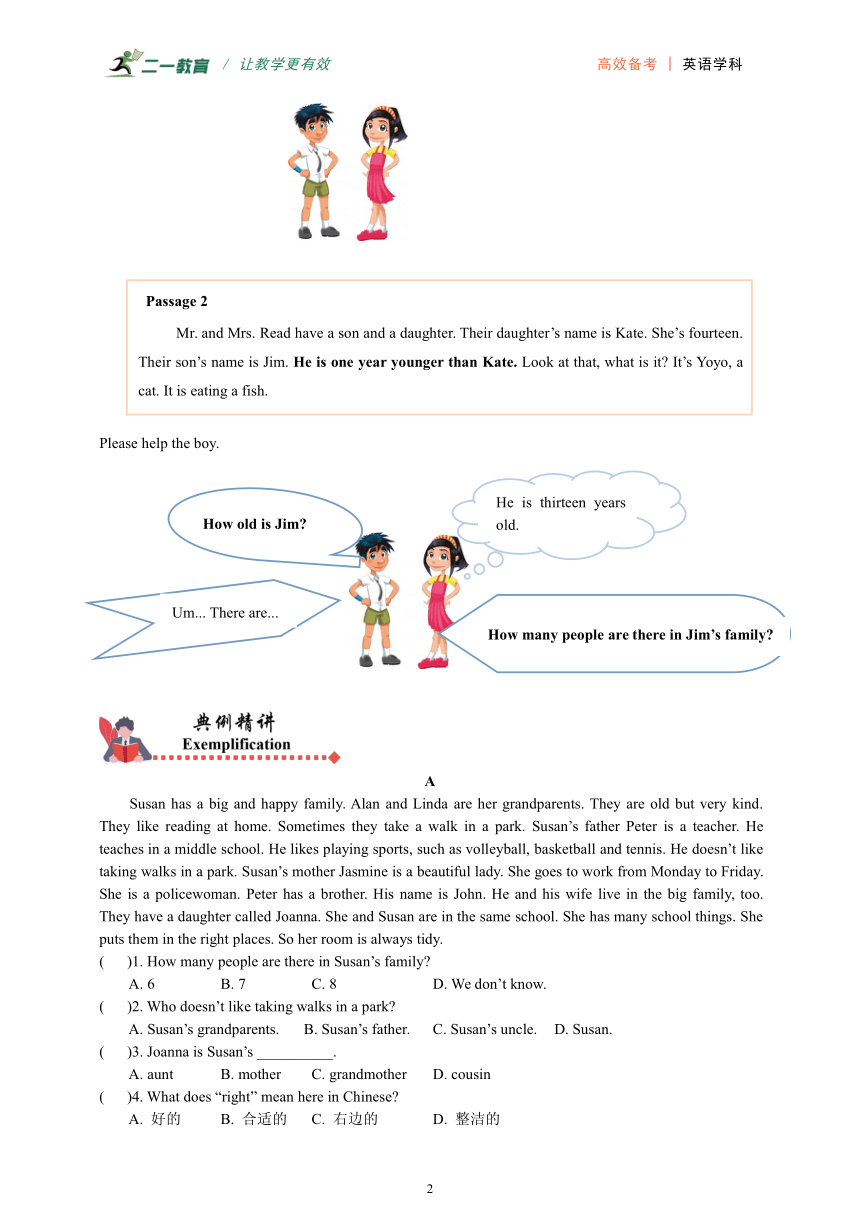
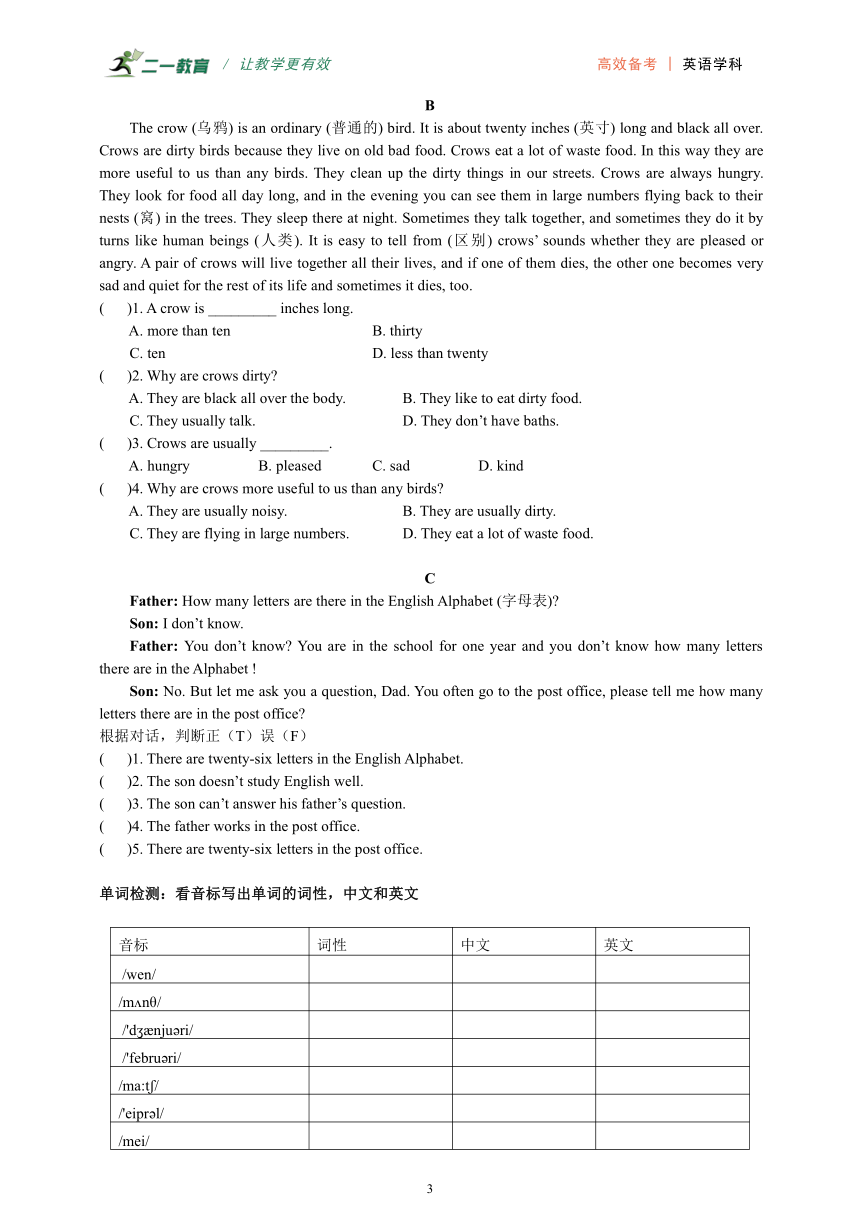
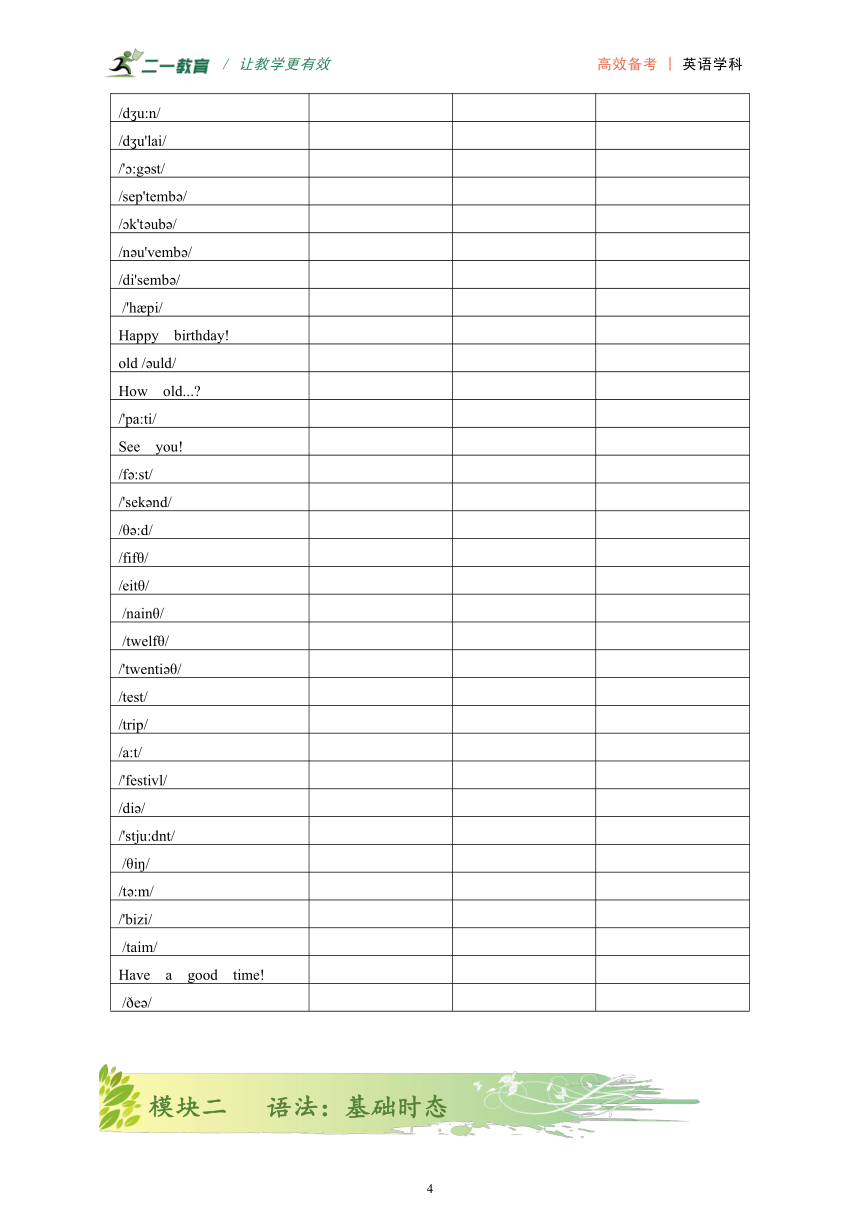
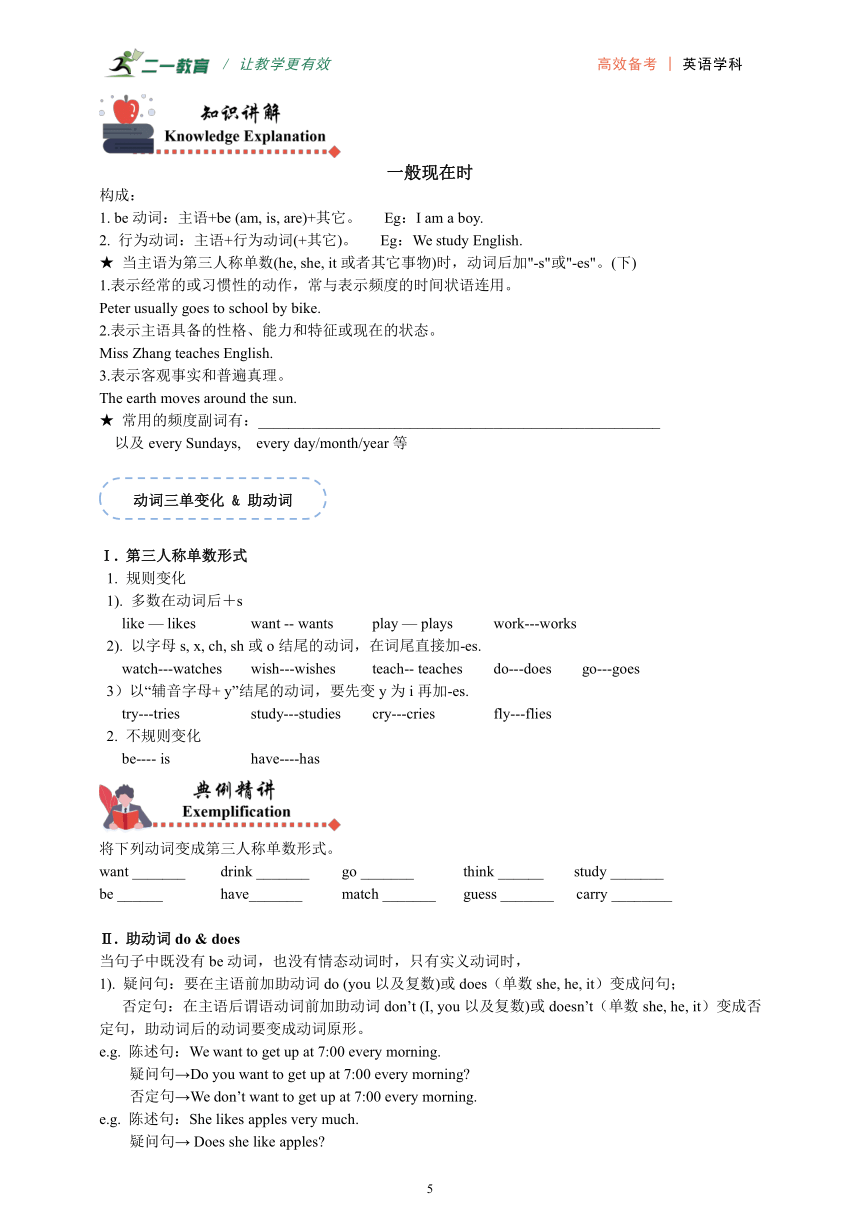
文档简介
/ 让教学更有效 高效备考 | 英语学科
1.阅读理解之逻辑推理的相关解题方法
2.基本时态的用法
用提问的方式导入:你掌握的阅读理解的方法有哪些?
阅读突破 ---逻辑推理题
Please help the boy.
A
Susan has a big and happy family. Alan and Linda are her grandparents. They are old but very kind. They like reading at home. Sometimes they take a walk in a park. Susan’s father Peter is a teacher. He teaches in a middle school. He likes playing sports, such as volleyball, basketball and tennis. He doesn’t like taking walks in a park. Susan’s mother Jasmine is a beautiful lady. She goes to work from Monday to Friday. She is a policewoman. Peter has a brother. His name is John. He and his wife live in the big family, too. They have a daughter called Joanna. She and Susan are in the same school. She has many school things. She puts them in the right places. So her room is always tidy.
( )1. How many people are there in Susan’s family
A. 6 B. 7 C. 8 D. We don’t know.
( )2. Who doesn’t like taking walks in a park
A. Susan’s grandparents. B. Susan’s father. C. Susan’s uncle. D. Susan.
( )3. Joanna is Susan’s __________.
A. aunt B. mother C. grandmother D. cousin
( )4. What does “right” mean here in Chinese
A. 好的 B. 合适的 C. 右边的 D. 整洁的
B
The crow (乌鸦) is an ordinary (普通的) bird. It is about twenty inches (英寸) long and black all over. Crows are dirty birds because they live on old bad food. Crows eat a lot of waste food. In this way they are more useful to us than any birds. They clean up the dirty things in our streets. Crows are always hungry. They look for food all day long, and in the evening you can see them in large numbers flying back to their nests (窝) in the trees. They sleep there at night. Sometimes they talk together, and sometimes they do it by turns like human beings (人类). It is easy to tell from (区别) crows’ sounds whether they are pleased or angry. A pair of crows will live together all their lives, and if one of them dies, the other one becomes very sad and quiet for the rest of its life and sometimes it dies, too.
( )1. A crow is _________ inches long.
A. more than ten B. thirty
C. ten D. less than twenty
( )2. Why are crows dirty
A. They are black all over the body. B. They like to eat dirty food.
C. They usually talk. D. They don’t have baths.
( )3. Crows are usually _________.
A. hungry B. pleased C. sad D. kind
( )4. Why are crows more useful to us than any birds
A. They are usually noisy. B. They are usually dirty.
C. They are flying in large numbers. D. They eat a lot of waste food.
C
Father: How many letters are there in the English Alphabet (字母表)
Son: I don’t know.
Father: You don’t know You are in the school for one year and you don’t know how many letters there are in the Alphabet !
Son: No. But let me ask you a question, Dad. You often go to the post office, please tell me how many letters there are in the post office
根据对话,判断正(T)误(F)
( )1. There are twenty-six letters in the English Alphabet.
( )2. The son doesn’t study English well.
( )3. The son can’t answer his father’s question.
( )4. The father works in the post office.
( )5. There are twenty-six letters in the post office.
单词检测:看音标写出单词的词性,中文和英文
音标 词性 中文 英文
/wen/
/m nθ/
/'d nju ri/
/'febru ri/
/ma:t /
/'eipr l/
/mei/
/d u:n/
/d u'lai/
/' :g st/
/sep'temb /
/ k't ub /
/n u'vemb /
/di'semb /
/'h pi/
Happy birthday!
old / uld/
How old...
/'pa:ti/
See you!
/f :st/
/'sek nd/
/θ :d/
/fifθ/
/eitθ/
/nainθ/
/twelfθ/
/'twenti θ/
/test/
/trip/
/a:t/
/'festivl/
/di /
/'stju:dnt/
/θi /
/t :m/
/'bizi/
/taim/
Have a good time!
/ e /
一般现在时
构成:
1. be动词:主语+be (am, is, are)+其它。 Eg:I am a boy.
2. 行为动词:主语+行为动词(+其它)。 Eg:We study English.
★ 当主语为第三人称单数(he, she, it或者其它事物)时,动词后加"-s"或"-es"。(下)
1.表示经常的或习惯性的动作,常与表示频度的时间状语连用。
Peter usually goes to school by bike.
2.表示主语具备的性格、能力和特征或现在的状态。
Miss Zhang teaches English.
3.表示客观事实和普遍真理。
The earth moves around the sun.
★ 常用的频度副词有:_____________________________________________________
以及every Sundays, every day/month/year等
Ⅰ. 第三人称单数形式
1. 规则变化
1). 多数在动词后+s
like — likes want -- wants play — plays work---works
2). 以字母s, x, ch, sh或o结尾的动词,在词尾直接加-es.
watch---watches wish---wishes teach-- teaches do---does go---goes
3)以“辅音字母+ y”结尾的动词,要先变y为i再加-es.
try---tries study---studies cry---cries fly---flies
2. 不规则变化
be---- is have----has
将下列动词变成第三人称单数形式。
want _______ drink _______ go _______ think ______ study _______
be ______ have_______ match _______ guess _______ carry ________
Ⅱ. 助动词do & does
当句子中既没有be动词,也没有情态动词时,只有实义动词时,
1). 疑问句:要在主语前加助动词do (you以及复数)或does(单数she, he, it)变成问句;
否定句:在主语后谓语动词前加助动词don’t (I, you以及复数)或doesn’t(单数she, he, it)变成否定句,助动词后的动词要变成动词原形。
e.g. 陈述句:We want to get up at 7:00 every morning.
疑问句→Do you want to get up at 7:00 every morning
否定句→We don’t want to get up at 7:00 every morning.
e.g. 陈述句:She likes apples very much.
疑问句→ Does she like apples
否定句→ She doesn’t like apples very much.
将下列句子变成否定句和一般疑问句。
1. I want to do homework this afternoon.
____________________________________
_____________________________________
2. She likes listening to music very much.
_____________________________________
_____________________________________
3. They play football very well.
_____________________________________
_____________________________________
一般过去时:
表示过去发生的动作或事情。经常与表示过去的时间连用:
I went to Yuexiu park yesterday.
Mr. Yang traveled to Cairo last weekend.
★ 动词的过去式的构成规则有:
A、规则动词
①一般直接在动词的后面加ed,如worked, learned, cleaned, visited
②以e结尾的动词直接加d,如lived, danced, used
③以辅音字母加y结尾的动词,要改y为i再加ed,如study – studied, carry – carried, worry– worried
④双写最后一个字母,如stopped
B、不规则动词的过去式:
sing – ___________ , eat – ___________ ,
take – ___________ , buy –___________ ,
get – ___________ , read – ___________ ,
fly – ___________ , say – ___________ ,
leave – _________ , swim –___________ ,
see – ___________ , write-___________ .
一般将来时:
表示在将来会发生的事或动作。常与表示将来的时间连用,如:_________________________________
构成:①be going to + 动词的原形 ②will/shall + 动词的原形
She is going to Hong Kong next week.
I will go shopping with my sister tomorrow.
现在进行时:
表示说话时或现阶段正在进行的动作。
标志: now listen look
构成:be ( is/am/are) + ~ ing
I’m writing a letter now.
They’re swimming.
Look! Amy is reading an English book.
★动词的ing形式的构成规则:
① 直接加ing , 如doing , going , working , singing , eating
② 以e 结尾的动词,要先去e再加ing,如having, writing
③ 双写最后一个辅音字母,再加ing:dropping
( )1. -He came early this morning, didn't he
-Yes, he did. He often___ to school early.
A. come B. comes C. came D. has come
( )2. The sun ___ in the east and___ in the west.
A. raises; set B. rise; sets C. rises; sets D. rises; set
( )3. ______ you ___ your homework now
A. Do; doing B. Are; doing C. Were; doing D. Does; do
( )4. My father___ breakfast at home every day.
A. hasn't B. isn't having C. doesn't have D. has had
( )5. There___ two English films next week.
A. is going to be B. are going to have C. will have D. are going to be
( )6. -_____ they often ___ these old men -Yes, they___.
A. Do; help; are B. Are; helping; are C. Do; help; do D. Are; helped; are
( )7. These little boys___ playing football.
A. are liking B. like C. likes D. were liking
( )8. ___ he ___ a good time last Sunday
A. Were; were B. Did; do C. Did; has D. Did; have
( )9. When he was a child, he____ in the garden in the morning.
A. always plays B. always played C. plays always D. played always
( )10. -What is he doing
-He ___ a picture.
A. draws B. drew C. is drawing D. was drawing
( )11. ____ she _____ her homework every day
A. does; do B. do; does C. Does; do D. Do; Does
( )12. They _____ home by bike sometimes.
A. goes B. don’t go C. doesn’t go D. went
( )13. Look! The children ______ kites over there.
A. flew B. fly C. are flying D. were flying
( )14. He ______ that film last weekend.
A. see B. didn’t saw C. didn’t see D. doesn’t saw
( )15.______ you______ your grandparents last Sunday
A. Do, visited B. Do, visit C. Did, visited D. Did, visit
I. 将下列时间按时态归类(☆)
now tomorrow yesterday often sometimes next week last night usually on Monday
this morning next weekend last year every day listen in the morning look
1. 现在进行时:_____________________________________________________________________________
2. 一般现在时:_____________________________________________________________________________
3. 一般过去时:_____________________________________________________________________________
4. 过去进行时:_____________________________________________________________________________ I
II. 根据要求写单词(☆)
(一)写出下列动词的现在分词。
1. play________ 2. make______________3. stop_____________4. ski_______________5. lie ____________
6. come_______ 7. jog________________8. eat______________9. have_____________10. see___________
(二)写出下列动词的第三人称单数。
1. go_________2. stay____________3. study______________4. pass_____________5. wash_____________
6. have_________7. do___________8. carry______________9. play_____________10. write____________
(三)写出下列动词的过去式。
1. go_________2. write__________3. play__________4. carry__________5. dance___________6. drink_______
7. eat_________8. are___________9. fly____________10. put__________11. read___________12. sleep______
Ⅲ. 用所给单词的适当形式填空(☆☆)
1. I _______( win ) a game every day. I ___________(win ) a game yesterday. I _______(win) a game now.
I ______________(win ) a game tomorrow.
2. He _______( do ) his homework in the evening. He _________( do ) his homework last night.
Look, he ____________( do ) his homework. He _________________( do ) his homework this evening.
3. We ___________( not play ) sports at night. We ___________( not play ) sports last week.
We ___________( not play )sports now. We ___________________(not play ) sports next week.
4. She ___________(not study)music on weekends. She ____________(not study )music now.
She ______________(not study ) music next Sunday. She _______________( not study ) music last Monday.
5. ________you ________(have ) a party on Sunday _________she __________(have ) a party on Sunday
_________you _______( have )a party last Sunday _________she _________( have ) a party now
__________you _______________(have ) a party tomorrow
IV. 选择正确的答案填空(☆)
( )1. What ________she _____________now
A. is/do B. does /do C. is /doing D. did/ do
( )2. _____you ____your homework in the evening
A. Are/ do B. Are/ doing C. Did/ do D. Do/ do
( )3. Mrs. Black ____________the cleaning on weekends.
A. do B. does C. did D. is doing
( )4. My aunt ________me a new toy yesterday.
A. buy B. buys C. bought D. is buying
( )5. I _________a new subject next year.
A. learn B. am learning C. learned D. am going to learn
( )6. Jenny’s grandparents __________doctors when they were young.
A. are B. were C. was D. is
( )7. It ________rainy tomorrow
A. will be B. is C. was D. is going to
( )8. Look, Ben __________a kite on the ground.
A. flies B. fly C. is flying D. flew
( )9. We _______morning exercise every morning.
A. do B. did C. are doing D. are going to do
( )10. Last year, May _______in an old city with her parents.
A. lived B. lives C. is living D. live
重点掌握时态的用法
I.单项选择(☆)
( )1. Do you like ______ housework
A. do B. does C. doing D. did
( )2. I ______ playing basketball.
A. am not like B. don’t like C. isn’t D. likes
( )3. ______ do you like about Tianjin
A. Why B. What C. Which D. Where
( )4. Which color ______
A. are you like B. she likes C. do you likes D. does she like
( )5.______ she like English
A. Is B. Are C. Do D. Does
II.翻译句子(每空一词)(☆)
1. 你们想要去动物园吗? ______ you ______ to go to the zoo
2. 她喜欢这本书吗? ______ she ______ this book
3. 我今天不想要回家。 I ______ ______ _____ go home today.
4. 我妈妈喜欢看电视。 My mother ______ ______ TV.
5. 我们英语老师教的很好。 Our English teacher ______ very well.
Ⅲ.用动词的适当形式填空(☆☆)
1.He _________(get) up at six o’clock.
2. __________you _________(brush) your teeth every morning
3.What_________ he __________ (do) after school
4.Danny (study) English, Chinese, Maths, Science and Art at school.
5.My mother and my father _________ (have) an exciting party last weekend.
6. --What ________ Tom ________ (do) on Saturday evening
-- He ________(watch) TV and ________(read) an interesting book.
7. They all _________(go) to the mountains yesterday morning.
8. She _________(not visit) her aunt last weekend.
9. We're_________(have) a party at Jane’s house now.
10. Our school _________(hold) a sports meeting next week.
IV. 阅读理解(☆☆)
A little boy didn’t say a word until he was three years old. His mother took him to every doctor, but there was no use. He was healthy and bright, so the doctors told his mother not to worry.
One morning the boy suddenly knocked on the table and cried out, “These eggs are terrible!” The mother was very glad at hearing her son speak, and asked, “Why didn’t you say anything before ”
“Well.” He answered, “up to now, the eggs have been very good.”
( )1.Why didn’t the little boy say a word
A. He didn’t want to say. B. He couldn’t say.
C. He was ill. D. There was something wrong with his health.
( )2.The little boy didn’t say a word before he was _________years old.
A. one B. two C. three D. four
( )3. What made the boy say his first word
A. An apple. B. A banana. C. An egg. D. A pear.
( )4. The mother was very _________ after hearing her son speak.
A. anxious B. worried C. angry D. glad
( )5. The boy was ________ after seeing every doctor.
A. ill B. healthy and bright C. foolish D. surprising
21世纪教育网 www.21cnjy.com 精品试卷·第 2 页 (共 2 页)
1.阅读理解之逻辑推理的相关解题方法
2.基本时态的用法
用提问的方式导入:你掌握的阅读理解的方法有哪些?
阅读突破 ---逻辑推理题
Please help the boy.
A
Susan has a big and happy family. Alan and Linda are her grandparents. They are old but very kind. They like reading at home. Sometimes they take a walk in a park. Susan’s father Peter is a teacher. He teaches in a middle school. He likes playing sports, such as volleyball, basketball and tennis. He doesn’t like taking walks in a park. Susan’s mother Jasmine is a beautiful lady. She goes to work from Monday to Friday. She is a policewoman. Peter has a brother. His name is John. He and his wife live in the big family, too. They have a daughter called Joanna. She and Susan are in the same school. She has many school things. She puts them in the right places. So her room is always tidy.
( )1. How many people are there in Susan’s family
A. 6 B. 7 C. 8 D. We don’t know.
( )2. Who doesn’t like taking walks in a park
A. Susan’s grandparents. B. Susan’s father. C. Susan’s uncle. D. Susan.
( )3. Joanna is Susan’s __________.
A. aunt B. mother C. grandmother D. cousin
( )4. What does “right” mean here in Chinese
A. 好的 B. 合适的 C. 右边的 D. 整洁的
B
The crow (乌鸦) is an ordinary (普通的) bird. It is about twenty inches (英寸) long and black all over. Crows are dirty birds because they live on old bad food. Crows eat a lot of waste food. In this way they are more useful to us than any birds. They clean up the dirty things in our streets. Crows are always hungry. They look for food all day long, and in the evening you can see them in large numbers flying back to their nests (窝) in the trees. They sleep there at night. Sometimes they talk together, and sometimes they do it by turns like human beings (人类). It is easy to tell from (区别) crows’ sounds whether they are pleased or angry. A pair of crows will live together all their lives, and if one of them dies, the other one becomes very sad and quiet for the rest of its life and sometimes it dies, too.
( )1. A crow is _________ inches long.
A. more than ten B. thirty
C. ten D. less than twenty
( )2. Why are crows dirty
A. They are black all over the body. B. They like to eat dirty food.
C. They usually talk. D. They don’t have baths.
( )3. Crows are usually _________.
A. hungry B. pleased C. sad D. kind
( )4. Why are crows more useful to us than any birds
A. They are usually noisy. B. They are usually dirty.
C. They are flying in large numbers. D. They eat a lot of waste food.
C
Father: How many letters are there in the English Alphabet (字母表)
Son: I don’t know.
Father: You don’t know You are in the school for one year and you don’t know how many letters there are in the Alphabet !
Son: No. But let me ask you a question, Dad. You often go to the post office, please tell me how many letters there are in the post office
根据对话,判断正(T)误(F)
( )1. There are twenty-six letters in the English Alphabet.
( )2. The son doesn’t study English well.
( )3. The son can’t answer his father’s question.
( )4. The father works in the post office.
( )5. There are twenty-six letters in the post office.
单词检测:看音标写出单词的词性,中文和英文
音标 词性 中文 英文
/wen/
/m nθ/
/'d nju ri/
/'febru ri/
/ma:t /
/'eipr l/
/mei/
/d u:n/
/d u'lai/
/' :g st/
/sep'temb /
/ k't ub /
/n u'vemb /
/di'semb /
/'h pi/
Happy birthday!
old / uld/
How old...
/'pa:ti/
See you!
/f :st/
/'sek nd/
/θ :d/
/fifθ/
/eitθ/
/nainθ/
/twelfθ/
/'twenti θ/
/test/
/trip/
/a:t/
/'festivl/
/di /
/'stju:dnt/
/θi /
/t :m/
/'bizi/
/taim/
Have a good time!
/ e /
一般现在时
构成:
1. be动词:主语+be (am, is, are)+其它。 Eg:I am a boy.
2. 行为动词:主语+行为动词(+其它)。 Eg:We study English.
★ 当主语为第三人称单数(he, she, it或者其它事物)时,动词后加"-s"或"-es"。(下)
1.表示经常的或习惯性的动作,常与表示频度的时间状语连用。
Peter usually goes to school by bike.
2.表示主语具备的性格、能力和特征或现在的状态。
Miss Zhang teaches English.
3.表示客观事实和普遍真理。
The earth moves around the sun.
★ 常用的频度副词有:_____________________________________________________
以及every Sundays, every day/month/year等
Ⅰ. 第三人称单数形式
1. 规则变化
1). 多数在动词后+s
like — likes want -- wants play — plays work---works
2). 以字母s, x, ch, sh或o结尾的动词,在词尾直接加-es.
watch---watches wish---wishes teach-- teaches do---does go---goes
3)以“辅音字母+ y”结尾的动词,要先变y为i再加-es.
try---tries study---studies cry---cries fly---flies
2. 不规则变化
be---- is have----has
将下列动词变成第三人称单数形式。
want _______ drink _______ go _______ think ______ study _______
be ______ have_______ match _______ guess _______ carry ________
Ⅱ. 助动词do & does
当句子中既没有be动词,也没有情态动词时,只有实义动词时,
1). 疑问句:要在主语前加助动词do (you以及复数)或does(单数she, he, it)变成问句;
否定句:在主语后谓语动词前加助动词don’t (I, you以及复数)或doesn’t(单数she, he, it)变成否定句,助动词后的动词要变成动词原形。
e.g. 陈述句:We want to get up at 7:00 every morning.
疑问句→Do you want to get up at 7:00 every morning
否定句→We don’t want to get up at 7:00 every morning.
e.g. 陈述句:She likes apples very much.
疑问句→ Does she like apples
否定句→ She doesn’t like apples very much.
将下列句子变成否定句和一般疑问句。
1. I want to do homework this afternoon.
____________________________________
_____________________________________
2. She likes listening to music very much.
_____________________________________
_____________________________________
3. They play football very well.
_____________________________________
_____________________________________
一般过去时:
表示过去发生的动作或事情。经常与表示过去的时间连用:
I went to Yuexiu park yesterday.
Mr. Yang traveled to Cairo last weekend.
★ 动词的过去式的构成规则有:
A、规则动词
①一般直接在动词的后面加ed,如worked, learned, cleaned, visited
②以e结尾的动词直接加d,如lived, danced, used
③以辅音字母加y结尾的动词,要改y为i再加ed,如study – studied, carry – carried, worry– worried
④双写最后一个字母,如stopped
B、不规则动词的过去式:
sing – ___________ , eat – ___________ ,
take – ___________ , buy –___________ ,
get – ___________ , read – ___________ ,
fly – ___________ , say – ___________ ,
leave – _________ , swim –___________ ,
see – ___________ , write-___________ .
一般将来时:
表示在将来会发生的事或动作。常与表示将来的时间连用,如:_________________________________
构成:①be going to + 动词的原形 ②will/shall + 动词的原形
She is going to Hong Kong next week.
I will go shopping with my sister tomorrow.
现在进行时:
表示说话时或现阶段正在进行的动作。
标志: now listen look
构成:be ( is/am/are) + ~ ing
I’m writing a letter now.
They’re swimming.
Look! Amy is reading an English book.
★动词的ing形式的构成规则:
① 直接加ing , 如doing , going , working , singing , eating
② 以e 结尾的动词,要先去e再加ing,如having, writing
③ 双写最后一个辅音字母,再加ing:dropping
( )1. -He came early this morning, didn't he
-Yes, he did. He often___ to school early.
A. come B. comes C. came D. has come
( )2. The sun ___ in the east and___ in the west.
A. raises; set B. rise; sets C. rises; sets D. rises; set
( )3. ______ you ___ your homework now
A. Do; doing B. Are; doing C. Were; doing D. Does; do
( )4. My father___ breakfast at home every day.
A. hasn't B. isn't having C. doesn't have D. has had
( )5. There___ two English films next week.
A. is going to be B. are going to have C. will have D. are going to be
( )6. -_____ they often ___ these old men -Yes, they___.
A. Do; help; are B. Are; helping; are C. Do; help; do D. Are; helped; are
( )7. These little boys___ playing football.
A. are liking B. like C. likes D. were liking
( )8. ___ he ___ a good time last Sunday
A. Were; were B. Did; do C. Did; has D. Did; have
( )9. When he was a child, he____ in the garden in the morning.
A. always plays B. always played C. plays always D. played always
( )10. -What is he doing
-He ___ a picture.
A. draws B. drew C. is drawing D. was drawing
( )11. ____ she _____ her homework every day
A. does; do B. do; does C. Does; do D. Do; Does
( )12. They _____ home by bike sometimes.
A. goes B. don’t go C. doesn’t go D. went
( )13. Look! The children ______ kites over there.
A. flew B. fly C. are flying D. were flying
( )14. He ______ that film last weekend.
A. see B. didn’t saw C. didn’t see D. doesn’t saw
( )15.______ you______ your grandparents last Sunday
A. Do, visited B. Do, visit C. Did, visited D. Did, visit
I. 将下列时间按时态归类(☆)
now tomorrow yesterday often sometimes next week last night usually on Monday
this morning next weekend last year every day listen in the morning look
1. 现在进行时:_____________________________________________________________________________
2. 一般现在时:_____________________________________________________________________________
3. 一般过去时:_____________________________________________________________________________
4. 过去进行时:_____________________________________________________________________________ I
II. 根据要求写单词(☆)
(一)写出下列动词的现在分词。
1. play________ 2. make______________3. stop_____________4. ski_______________5. lie ____________
6. come_______ 7. jog________________8. eat______________9. have_____________10. see___________
(二)写出下列动词的第三人称单数。
1. go_________2. stay____________3. study______________4. pass_____________5. wash_____________
6. have_________7. do___________8. carry______________9. play_____________10. write____________
(三)写出下列动词的过去式。
1. go_________2. write__________3. play__________4. carry__________5. dance___________6. drink_______
7. eat_________8. are___________9. fly____________10. put__________11. read___________12. sleep______
Ⅲ. 用所给单词的适当形式填空(☆☆)
1. I _______( win ) a game every day. I ___________(win ) a game yesterday. I _______(win) a game now.
I ______________(win ) a game tomorrow.
2. He _______( do ) his homework in the evening. He _________( do ) his homework last night.
Look, he ____________( do ) his homework. He _________________( do ) his homework this evening.
3. We ___________( not play ) sports at night. We ___________( not play ) sports last week.
We ___________( not play )sports now. We ___________________(not play ) sports next week.
4. She ___________(not study)music on weekends. She ____________(not study )music now.
She ______________(not study ) music next Sunday. She _______________( not study ) music last Monday.
5. ________you ________(have ) a party on Sunday _________she __________(have ) a party on Sunday
_________you _______( have )a party last Sunday _________she _________( have ) a party now
__________you _______________(have ) a party tomorrow
IV. 选择正确的答案填空(☆)
( )1. What ________she _____________now
A. is/do B. does /do C. is /doing D. did/ do
( )2. _____you ____your homework in the evening
A. Are/ do B. Are/ doing C. Did/ do D. Do/ do
( )3. Mrs. Black ____________the cleaning on weekends.
A. do B. does C. did D. is doing
( )4. My aunt ________me a new toy yesterday.
A. buy B. buys C. bought D. is buying
( )5. I _________a new subject next year.
A. learn B. am learning C. learned D. am going to learn
( )6. Jenny’s grandparents __________doctors when they were young.
A. are B. were C. was D. is
( )7. It ________rainy tomorrow
A. will be B. is C. was D. is going to
( )8. Look, Ben __________a kite on the ground.
A. flies B. fly C. is flying D. flew
( )9. We _______morning exercise every morning.
A. do B. did C. are doing D. are going to do
( )10. Last year, May _______in an old city with her parents.
A. lived B. lives C. is living D. live
重点掌握时态的用法
I.单项选择(☆)
( )1. Do you like ______ housework
A. do B. does C. doing D. did
( )2. I ______ playing basketball.
A. am not like B. don’t like C. isn’t D. likes
( )3. ______ do you like about Tianjin
A. Why B. What C. Which D. Where
( )4. Which color ______
A. are you like B. she likes C. do you likes D. does she like
( )5.______ she like English
A. Is B. Are C. Do D. Does
II.翻译句子(每空一词)(☆)
1. 你们想要去动物园吗? ______ you ______ to go to the zoo
2. 她喜欢这本书吗? ______ she ______ this book
3. 我今天不想要回家。 I ______ ______ _____ go home today.
4. 我妈妈喜欢看电视。 My mother ______ ______ TV.
5. 我们英语老师教的很好。 Our English teacher ______ very well.
Ⅲ.用动词的适当形式填空(☆☆)
1.He _________(get) up at six o’clock.
2. __________you _________(brush) your teeth every morning
3.What_________ he __________ (do) after school
4.Danny (study) English, Chinese, Maths, Science and Art at school.
5.My mother and my father _________ (have) an exciting party last weekend.
6. --What ________ Tom ________ (do) on Saturday evening
-- He ________(watch) TV and ________(read) an interesting book.
7. They all _________(go) to the mountains yesterday morning.
8. She _________(not visit) her aunt last weekend.
9. We're_________(have) a party at Jane’s house now.
10. Our school _________(hold) a sports meeting next week.
IV. 阅读理解(☆☆)
A little boy didn’t say a word until he was three years old. His mother took him to every doctor, but there was no use. He was healthy and bright, so the doctors told his mother not to worry.
One morning the boy suddenly knocked on the table and cried out, “These eggs are terrible!” The mother was very glad at hearing her son speak, and asked, “Why didn’t you say anything before ”
“Well.” He answered, “up to now, the eggs have been very good.”
( )1.Why didn’t the little boy say a word
A. He didn’t want to say. B. He couldn’t say.
C. He was ill. D. There was something wrong with his health.
( )2.The little boy didn’t say a word before he was _________years old.
A. one B. two C. three D. four
( )3. What made the boy say his first word
A. An apple. B. A banana. C. An egg. D. A pear.
( )4. The mother was very _________ after hearing her son speak.
A. anxious B. worried C. angry D. glad
( )5. The boy was ________ after seeing every doctor.
A. ill B. healthy and bright C. foolish D. surprising
21世纪教育网 www.21cnjy.com 精品试卷·第 2 页 (共 2 页)
同课章节目录
